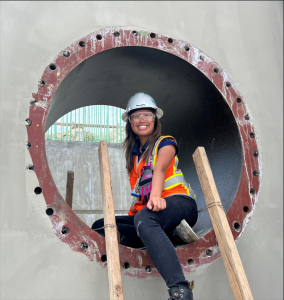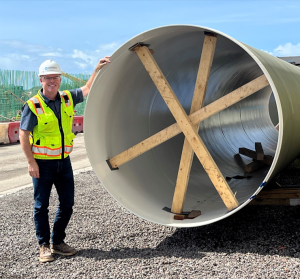Executive Summary. A recent discussion with a soon-to-be civil engineering graduate spurred this article on what your options are heading towards “the real world.” Here’s your three options in my mind.
What’s a civil engineer? Simply put, civil engineers improve the quality of life for the planet’s residents.
We maintain and improve the world’s infrastructure: roads, highways, water bodies, buildings, utilities, water and wastewater, and environmental components of our daily living. It’s a vast study and everyone on earth is affected by our work on a daily basis.

So, what are the three roads? Construction, engineering, or construction management:
- Construction – you start as a field engineer (on the jobsite usually) in boots, jeans, a hardhat, and a neon vest. You do survey, you do layout, you log truckloads of aggregate, you watch concrete being poured, you order lumber, et cetera. After you understand how to build something, then you learn about how much it costs. You track material costs, labor costs, and installation productions. From there you get into change order negotiations and construction law. Then you run the whole division and up from there.
- Engineering – here you will be mostly confined to an office and you will put on paper (digital paper) what is built by the people in #1 above. You read studies on community needs, water capacity available to feed a building, contaminants in groundwater, and the like. From there you translate this information into specifications and drawings which are then turned over to the constructors.
- Construction management – this is an in-between of #1 and #2 above, but more construction than engineering. As a construction manager you will act on behalf of the owner. So if Disney is building a theme park or Columbus, Ohio is building a sewer line, you will be out on site managing paperwork on Disney’s or City of Columbus’ behalf. Submittals, RFIs (requests for information), change orders, field directives, request for proposals – these are all documents you will shepherd between Contractor and Owner, or that you will generate on your own. You’re not really “building anything” and you’re not “designing anything” either. You’re managing a process and ensuring adherence to a standard. This can be a field job or an office job.
Well, which one should I do? If you like being outside in the elements, you like political incorrectness, and you like long hours, your best bet is construction. Depending on the company this is likely your

highest paying job. Maybe its second to construction management. Being in construction, with a regional or national firm, usually means travel. You’ve got to go where the jobs are. If you like numbers and a controlled work environment and you like the quiet – likely engineering suits you. You can sit in Philadelphia and design a job in Dallas no problem. Obviously being a field engineer sitting in Philadelphia for a job in Dallas is not realistic. Lastly, being exposed to construction, seeing the work, making good money, and not necessarily working as many hours – well, construction management (or “CM”) may be for you.
My story. I grew up laboring for my dad’s construction business, and then went to Drexel University where cooperative education was mandatory. I had the benefit of having five jobs in civil engineering before I even graduated college. I knew I wanted to be in construction and had a resume that was fantastic. This career has been great to me. I’ve done field engineering up to division manager to construction company owner. I do construction management now and also a lot of expert witness and litigation support. My advice to you (if you don’t have opportunities to intern or do cooperative

education) is to seek out the advice of a family member, or even better, a family member’s friend or colleague, and ask them what they have to say. If you really want to make a mark (in a positive way), go to the internet and find a local firm in civil engineering and show up IN PERSON well-dressed with a resume and just see if you can make an appointment to have a twenty minute conversation with someone in the office about career advice. I know what you’re saying: “well, that’s awkward and atypical, no one’s going to ever want to see me and spend time with me”. Well, you never know until you try and when you get there in front of someone 25 to 52 (my age), you can just say “there’s this crazy civil engineer construction guy who has this podcast who said that if I came in here and met with you it’d be the first time you ever saw anything like it and it likely could open doors for me. So, I said heck with it, and just went for it.” Voilà, your new employer, or the person who introduced you to your first employer will be sitting in front of your very eyes only 3 feet away sipping coffee in amazement of your ballsiness.
You’re welcome.
Work safe!






0 Comments